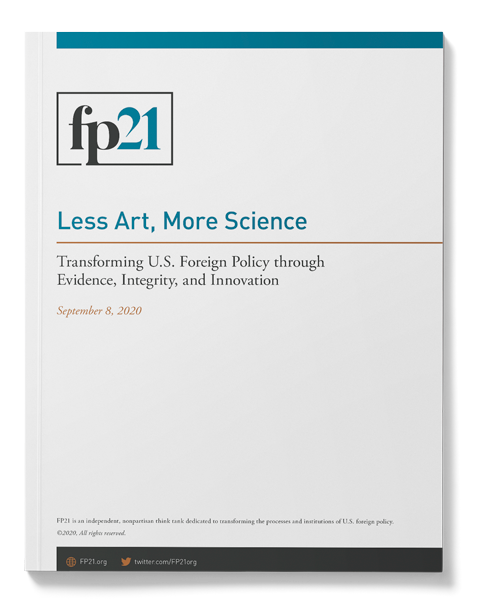Less Art, More Science:
Transforming U.S. Foreign Policy through Evidence, Integrity, and Innovation
September 8, 2020
Executive Summary
The United States faces increasingly complex international challenges, but the organizations tasked with leading our foreign policy are stuck in the past. Instead of investing in modern technologies to capitalize on today’s superabundance of information and assessing it objectively in a culture of evidence, the system continues to rely on the subjective judgment of its leaders, making it possible to cherry pick facts to defend opinion, ideology, and turf. Rather than rewarding leadership, merit, and diversity, our homogeneous workforce rewards “kissing up and kicking down.”
This report lays out a framework to achieve a more effective and modern culture of evidence-based foreign policymaking. From Silicon Valley to financial services, political campaigns to baseball, today’s most successful enterprises have built cultures grounded in evidence, analytics, and innovation. To lead in the 21st century, our government must harness more scientific tools to extract insight from a complex world and design better policy. Less Art, More Science lays out a pragmatic plan to transform the processes and institutions of foreign policy at each phase of policy making.
I. Information Collection
Now: The bureaucracy collects considerable information and data, but our knowledge management structures are outdated, and the government does not invest in research that responds to the challenges of our foreign policy professionals, undermining effectiveness.
FP21: Knowledge management can improve by institutionalizing new standards, building an accessible database, and assigning “librarians” in each office to support knowledge management. Foreign policy focused research and data can be expanded by collecting more policy-relevant quantitative data, upgrading State’s Bureau of Intelligence and Research with an Office of Social Science Research, and directing Offices of the Historian to support policymaking.
II. Analysis
Now: The methods that policy analysts use to gather and evaluate evidence are ad hoc and subjective. Without a process that surfaces and rewards analysis with the strongest evidentiary basis and rationale, arriving at good policy depends on the idiosyncrasies of those involved.
FP21: Analytical techniques can be upgraded by expanding both the basic toolkit for all officials, and implementing advanced approaches. Strong analysis must be better integrated into the policy process to be meaningful and effective. This can be achieved by requiring the citation of evidence in analytical products, evaluating and rewarding strong analysis, and creating cross-regional and cross-agency teams to conduct analyses.
III. Policy Decisions
Now: Policymaking is often disconnected from analysis and long-term strategic thinking, allowing decision-makers to advocate for favored positions without assessing what steps can be expected to achieve success.
FP21: An evidence-based process is a matter of design, beginning with a new policy memo template and requirements for evidence, measurable metrics of success, and alternative policy recommendations. Mechanisms for quality control, like policy review panels, “red team” processes, and performance metrics should be implemented. Processes for long-term planning must be institutionalized. Steps include revitalizing the Foreign Affairs Policy Board and embedding planning positions in policy bureaus and on large policy desks.
IV. Learning and Accountability
Now: Our foreign policy apparatus rarely learns from the successes and failures of our policies because there are no effective processes to transform lessons into behavioral change.
FP21: Monitoring and evaluation standards for major policy initiatives are necessary for learning and accountability. Policymaking agencies should require high quality handover notes and exit interviews for all staff, and establish learning teams to support the practical application of lessons.
V. Personnel and Organizational Change
Now: Our foreign policy agencies should promote the most effective staff, train personnel on today’s most effective skills, and recruit a diverse pool of talent. An effective institution constantly upgrades itself, invests in new tools and approaches, and dispenses with stale and ineffective methods.
FP21: By valuing diversity, the most qualified employees will be recruited and promoted. To achieve this, FP21 recommends a range of initiatives that include appointing a blue ribbon panel to study and redefine merit, updating entrance exam and promotion precepts to emphasize new skills, appointing a Chief Inclusion Officer to monitor and improve diversity, and formalizing management practices for LGBTQ employees. Bringing evidence into decisions requires training a 21st century workforce. Our organization must require all officials to have basic data literacy, reward training within the promotion process, and enable vertical and horizontal mobility for Civil Service officers.



